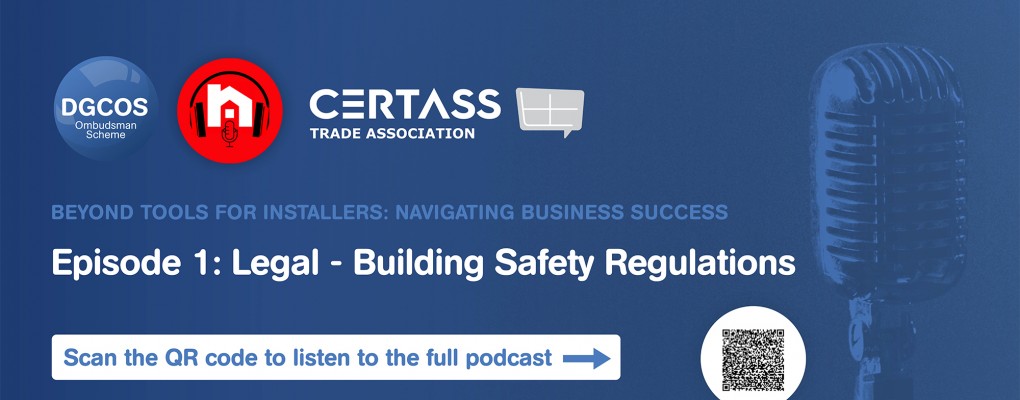With NHIC’s Anna Scothern as host, guest speakers Jon Vanstone, the Chair of the Competent Persons Scheme; Certass, and Faisal Hussain the Chief Executive of the consumer protection scheme; DGCOS, the Legal & Compliance podcast (part of the ‘Beyond Tools: Navigating Business Success’ series) explores the recent regulatory shifts, their implications, and the roles of competence and consumer protection schemes in the sector. This latest episode will provide valuable insights into the evolving regulations and the importance of competence in ensuring consumer safety.
As many will already be aware, the regulatory framework has been significantly influenced by the Grenfell tragedy, the fall out of which puts spotlight on the severe flaws in existing laws and regulations, prompting an independent review and the eventual creation of the Building Safety Bill, now the Building Safety Act. This act introduced two new regulators: the Building Safety Regulator and the National Regulator for Construction Products. The Building Safety Regulator oversees the safety of buildings and the competence of those involved in construction, while the National Regulator for Construction Products ensures that the materials used meet safety standards. These co-regulators work in tandem to enhance building competence standards across the board, ensuring the safety of buildings and the people who inhabit them.
Jon explains the driving force behind the change: “One key factor in the tragedy, residents were ignored. This is the point of the act, putting residents at the heart of the decisions as they are the ones that suffered.”
“It is important listeners know how to work within the new rules and regulations. If ignored, they will be taken to court.”
The new building safety regulations have profound implications for installers, and depending on their area of work, installers must adhere to proportional requirements. Jon uses an example that a window installer in the domestic sector must demonstrate competence through continuous professional development (CPD) and adherence to the correct use of approved products, further emphasising the need for installers to stay informed and compliant with the new regulations.
As part of the change, Building Control has undergone structural changes, with inspectors and approved bodies now operating under stringent oversight. This ensures greater reliability and accountability in the industry.
Ensuring compliance and competence
Another important factor to consider is the importance of installers demonstrating competence, which can be done through recognised schemes. Faisal explains how vital it is to “distinguish between competent person schemes and consumer protection schemes”. While competent person schemes ensure that installers comply with building regulations, consumer protection schemes offer mechanisms like mediation and financial protection to protect consumers using the services of their members. Faisal emphasises to listeners that, “it is crucial to understand these differences to ensure both regulatory compliance and consumer safety.”
Faisal provides three key recommendations for ensuring compliance:
1. Stay informed through trusted sources like government websites.
2. Assess the competence of everyone within the business and adhere to industry frameworks.
3. Communicate effectively with customers, providing them with accurate information and guidance on product usage.
Jon focuses on the importance of continuous professional development (CPD), encouraging installers that they “must keep themselves updated on regulatory changes and work with reliable sources to ensure compliance”.
Myths and misconceptions
Jon goes on to address the common myths and misconceptions surrounding product responsibility in the field of building safety regulations. He emphasised that the regulations “apply to all buildings, not just high-rise structures, and every individual involved in the construction process must adhere to them”. He adds that homeowners are also responsible for their buildings and there is legal responsibility there, concluding that “there are too many horrible stats in the UK, a lot of ownership and responsibility needs to be accounted for, a sorry ‘I didn’t know’ is not a good enough excuse.”
Future directions
The construction industry is undergoing significant changes aimed at improving safety and competence. With leaders like Jon and Faisal guiding support, the focus on compliance and consumer protection ensures that the sector moves towards a safer, more reliable future, promoting a culture of competence and accountability. Installers and consumers alike must stay informed and proactive in adapting to these new regulations, ensuring that the tragic lessons from Grenfell lead to a more secure built environment for all.
Listen to the full episode: https://nhic.org.uk/the-nhic-podcast-beyond-tools-navigating-business-success-series/

